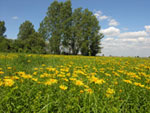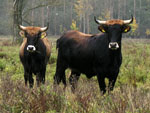Species introduction and management of biodiversity in restoration projects
SER Summer School Restoration Ecology 2009
University of Münster - Germany | 29th of June - 3rd of July 2009
General Information
 In summer 2009, a 5-day summer school programme on “Species introduction and management of biodiversity in restoration projects” will be held at the University of Münster under the auspices of the Society of Ecological Restoration Europe (SER Europe). This course is primarily intended for PhD students who work in restoration ecology and related fields.
In summer 2009, a 5-day summer school programme on “Species introduction and management of biodiversity in restoration projects” will be held at the University of Münster under the auspices of the Society of Ecological Restoration Europe (SER Europe). This course is primarily intended for PhD students who work in restoration ecology and related fields.
The programme includes lectures of specialists to provide theoretical background, field work and excursions to train practical research skills and learn about restoration projects on-site, as well as short presentations of research projects by the participants. Thus, the course will provide students with a general overview on restoration ecology as well as detailed information on projects, techniques and skills. It will also give a frame for intensive exchange between participants and lecturers.
Thematic Framework
 Traditionally, abiotic factors such as raised nutrient levels and changes in hydrology were thought to be the major constraints to the restoration of endangered communities and ecosystems. The experience of the past decade taught us that factors such as habitat fragmentation, seed bank depletion, dispersal-, seed- and microsite limitation are of similar or even higher importance. Besides these natural constraints the wise and sustainable management of semi-natural habitats is often a major challenge after successful restoration.
Traditionally, abiotic factors such as raised nutrient levels and changes in hydrology were thought to be the major constraints to the restoration of endangered communities and ecosystems. The experience of the past decade taught us that factors such as habitat fragmentation, seed bank depletion, dispersal-, seed- and microsite limitation are of similar or even higher importance. Besides these natural constraints the wise and sustainable management of semi-natural habitats is often a major challenge after successful restoration.
The course will provide contributions to all these aspects including abiotic site conditions, seed bank persistence and dispersal, recruitment, population genetics, techniques for the re-establishment of target species and communities and the implementation of suitable management schemes to maintain habitats and preserve biodiversity.
Topics
- general introduction to restoration ecology
- restoring soil microbial communities – the importance of below ground processes
- the role of seed banks and germination in restoration
- the role of seed provenance in restoration
- restoring plant communities by diaspore transfer
- plant-animal interactions in restoration – pollination as a key process
- restoring animal communities – dispersal as a key factor
- management of faunistic diversity
- restoration management in degraded fens and bogs
- reintroduction of plant species to acidified grass- and heathlands
- counteracting atmospheric nutrient deposition in heathlands
- grazing as a tool in restoration
- restoration in practice – evaluation of methods
- restoring meadow bird communities
- application of multivariate statistics in restoration ecology
Lecturers
- Armin Bischoff (University of Anger/F)
- Roland Bobbink (University of Nijmegen/NL)
- Martin Diekmann (University of Bremen/D)
- Rudy van Diggelen (University of Antwerp/B)
- Carsten Eichberg (University of Trier/Darmstadt/D)
- Thomas Fartmann (University of Münster/D)
- Werner Härdtle (University of Lüneburg/D)
- Norbert Hölzel (University of Münster/D)
- Kai Jensen (University of Hamburg/D)
- Kathrin Kiehl (University of Applied Sciences, Osnabrück/D)
- Anita Kirmer (Anhalt University of Applied Sciences, Bernburg/D)
- Michael Kuhlmann (British Natural History Museum, London/UK)
- Ilona Leyer (University of Marburg/D)
- Gert Rosenthal (University of Kassel/D)
- Alfons Smolders (University of Nijmegen/NL)
- Jac. A.A. Swart (University of Groningen/NL)


